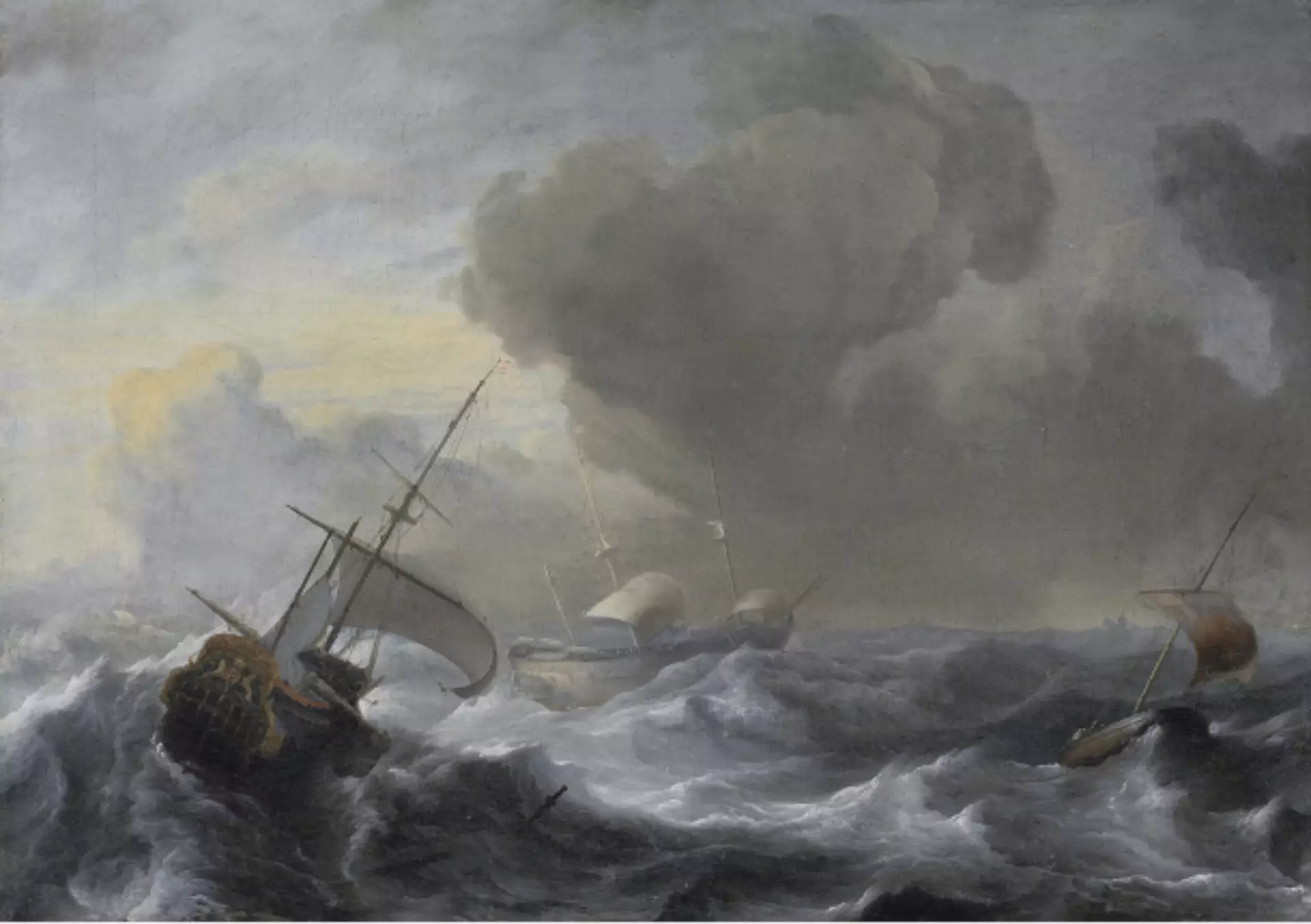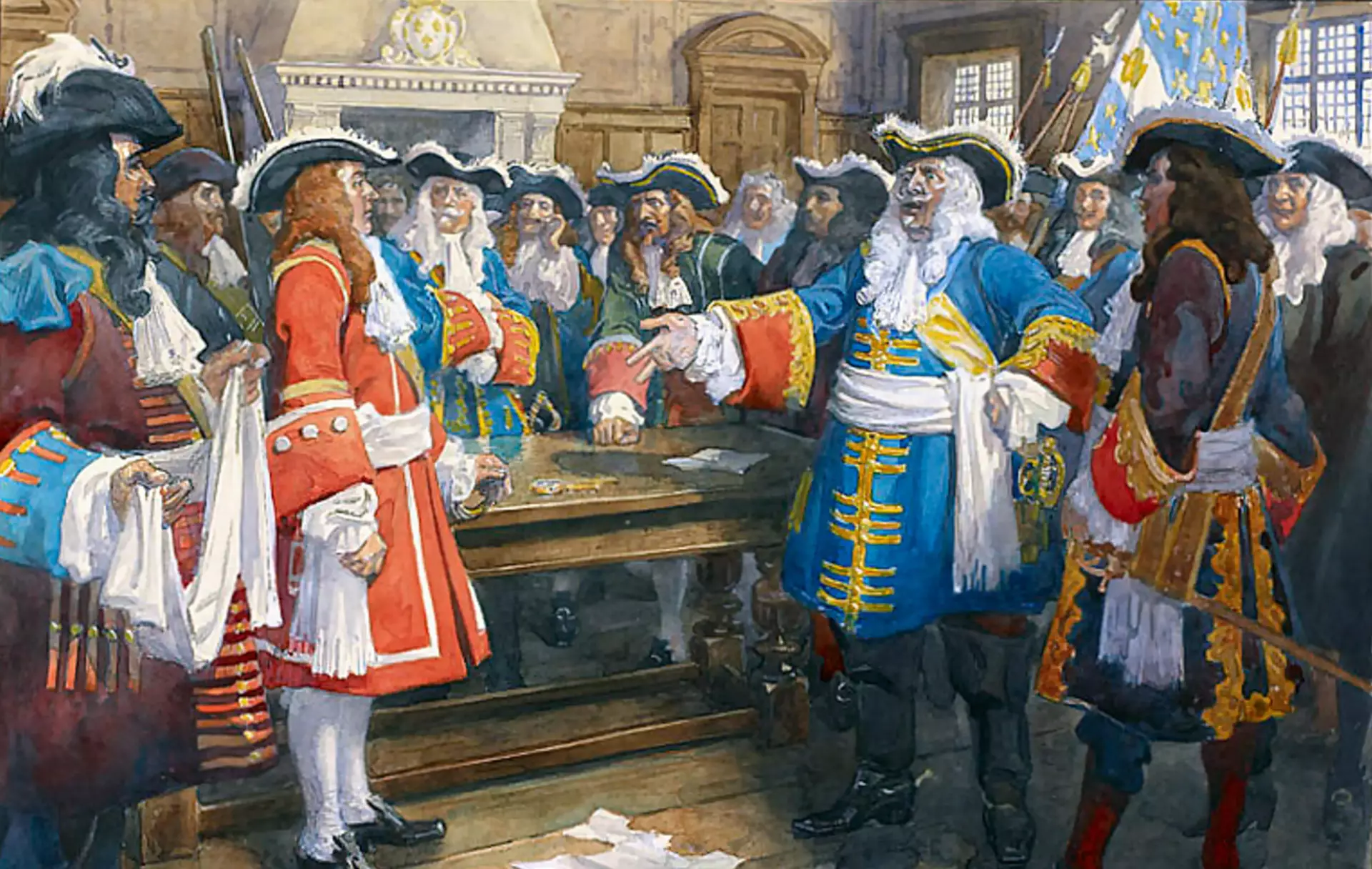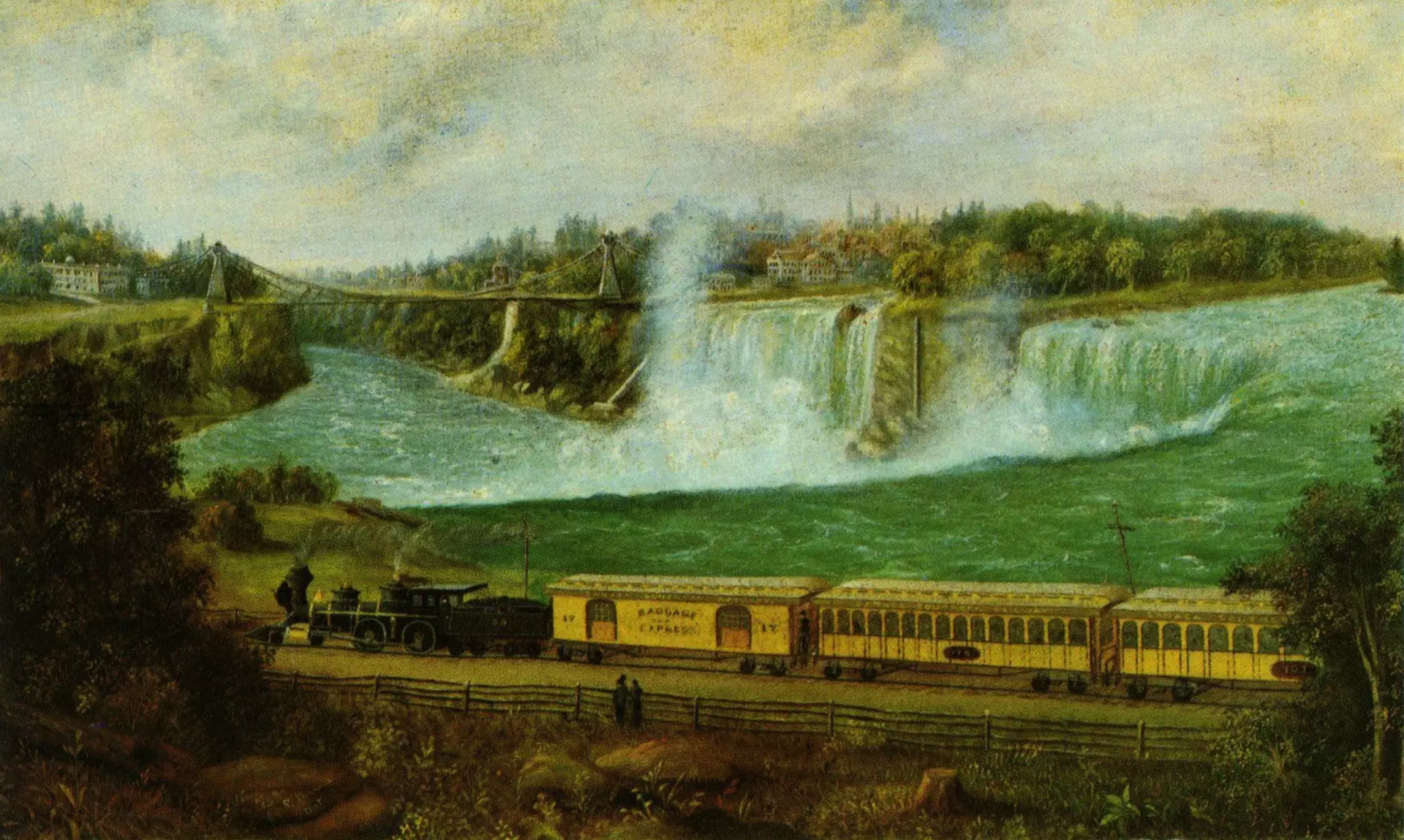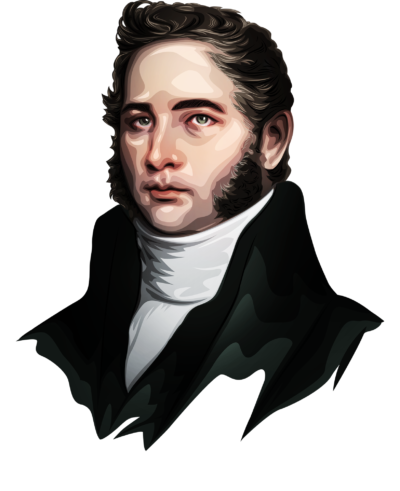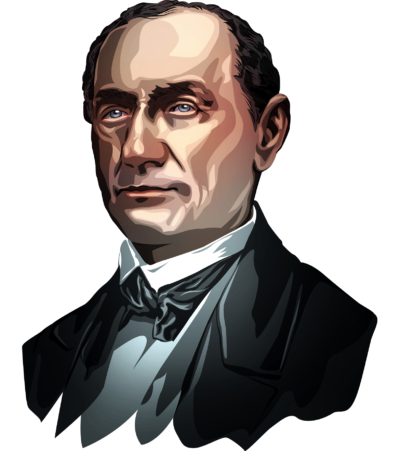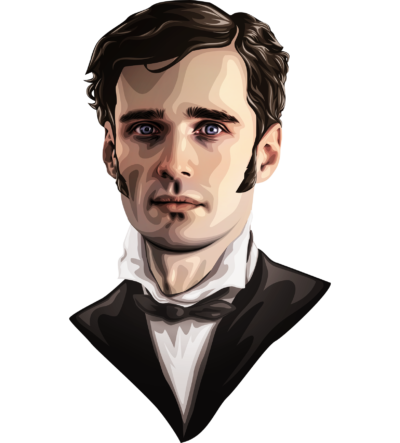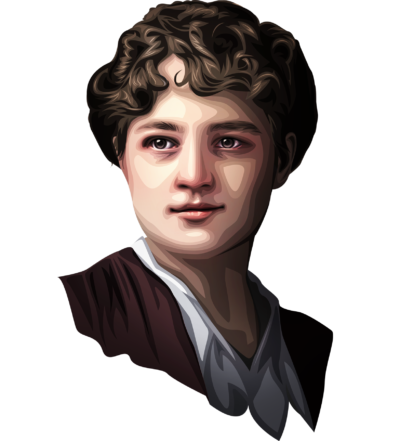Making
their way
in unfamiliar terrain
The Treaty of Paris, signed in 1763, recognized the victory of the English and placed all of New France under British control.
It was a crushing defeat, but many of the habitants were . . . relieved.
The wars had come to an end and many decided to forge new alliances.
French Canadians—known as the Canadiens—found themselves at a disadvantage vis-à-vis the British who were now in charge. They would have to work hard to clear a path to success, against all odds.

Treaty of Paris. Imprimerie royale, 1763.
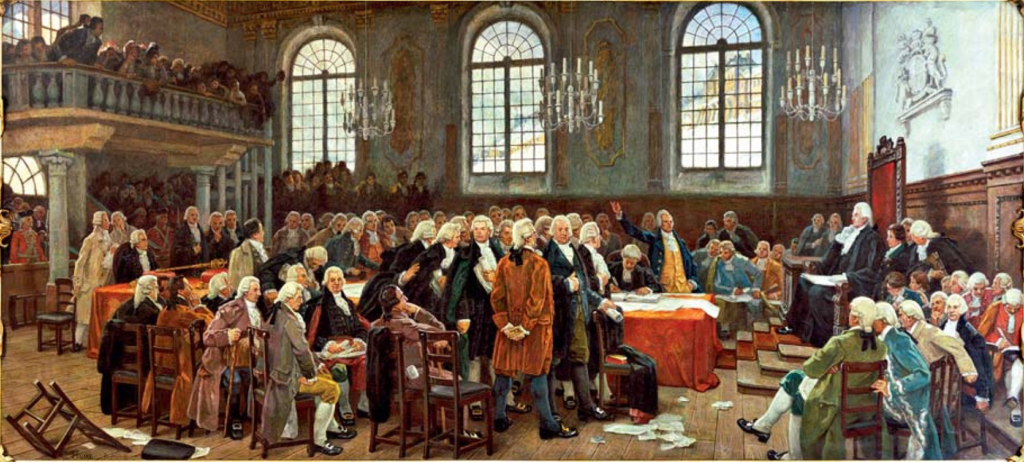
The Language Debate. Charles Huot, ca. 1910-1913.
THE WRITER
Philippe Aubert de Gaspé
The one who made Lord Durham eat his words


He was the last seigneur of Saint-Jean-Port-Joli, a well-known lawyer and sheriff of the Quebec City district. But he suffered many financial setbacks and even served time in prison before achieving lasting fame. How did he make Lord Durham eat his words?
French values, an English education
The last seigneur of Saint-Jean-Port-Joli was a lawyer by training and co-founder of Quebec’s first literary society. He married a beautiful American woman named Suzanne Allison and lived a life worthy of a novel.

Philippe-Joseph Aubert de Gaspé. Pierre-Narcisse Hamel, 1879.
By the time Philippe Aubert de Gaspé was born, the French regime in Saint-Jean-Port-Joli had come to an end. The Aubert de Gaspé family lived a modest life in the seigneurial mill, the only inhabitable building since the manor had gone up in flames during the Conquest, in 1759.

Saint-Jean-Port-Joli-de Gaspé Manor. E. Mercier Cacouna, ca. 1980.
Philippe Aubert de Gaspé grew up in Quebec City and was passionate about French literature from an early age. Inspired by his ancestors, Charles Aubert de La Chesnaye and Madeleine de Verchères, he immersed himself in the French Canadian values and customs that had been passed down through generations.
But to ensure his future success, Philippe had to become part of the governing British elite. In 1795, his father enrolled him in a private English school. After completing his classical education at the Petit Séminaire de Québec, he studied law under Jonathan Sewell, the most reputable lawyer in Quebec City.

Sewell House, 87 Saint-Louis St., Quebec: Overview. Luc Noppen, 1975.
THE BELLE OF THE BALL

Suzanne Allison, Mrs. Philippe Aubert de Gaspé. ca. 1847.
The daughter of a Scottish soldier and French Canadian mother, Suzanne Allison was considered the most gracious young woman in Quebec City. As soon as the romantic young Philippe was admitted to the bar in 1811, he proposed to her.
The woman he nicknamed the belle des belles (“the most beautiful of them all”) would give him nine sons and four daughters.

One of a kind
Philippe Aubert de Gaspé was appointed sheriff of the Quebec City district in 1816. At the age of 30, he was in charge of keeping the peace, appointing jurors, enforcing sentences, making arrests and collecting fines.
The young lawyer distinguished himself in high society. He founded the Société littéraire de Québec during his studies and was also a founding member of the Jockey Club and the Quebec Bank.
François-Guillaume Andrieux Reading in the Lobby of the Comédie Française, Salon of 1847. François-Joseph Heim, 1847.
A charmer and quite the character, Philippe Aubert lived beyond his means. He held popular literary soirées at his home where guests read French poetry and novels out loud.
While he was living in the seigneurial manor, he apparently took it upon himself to educate his children and others who lived nearby.

Dance in the Château St. Louis, 1801. George Heriot, 1801.
A OUTLAW SHERIFF
By 1820, Philippe was weighed down with debts from his real estate investments, and creditors were hot on his heels. His father, Pierre-Ignace Aubert de Gaspé, disinherited him, thus protecting the seigneury for future generations.

The Honourable Pierre-Ignace Aubert de Gaspé. 1879.
In 1822, the judge Jonathan Sewell, who had trained Philippe as a lawyer, relieved him of his sheriff duties, accusing him of embezzling funds.
“Overnight, the man who had shone brightly in Quebec City’s high society became an outlaw, practically a pariah.”

Lower Canada Currency. Quarter-Dollar and Half-Dollar Bills. ca. 1835.
In 1826, following an investigation, Philippe Aubert de Gaspé was ordered to repay a sum of 1,974 pounds—close to 20 times his annual income.
But on May 29, 1838, the day when Lord Durham arrived in Lower Canada, Philippe Aubert de Gaspé was arrested and incarcerated in Quebec City—in the prison he had once run.

Morrin College – Distant View of the Facade and Right Side. Thaddée Lebel, ca. 1930.

The Jail on St. Stanislas Street. James Pattison Cockburn. ca. 1830.
Finding his vocation . . . in jail
Philippe was deeply affected by the death of his oldest son in 1841, whom he had not seen again. So he began to write.
In his novel Les Anciens Canadiens (The Canadians of Old), the prisoner describes his children who were so close to his cell and yet so far.
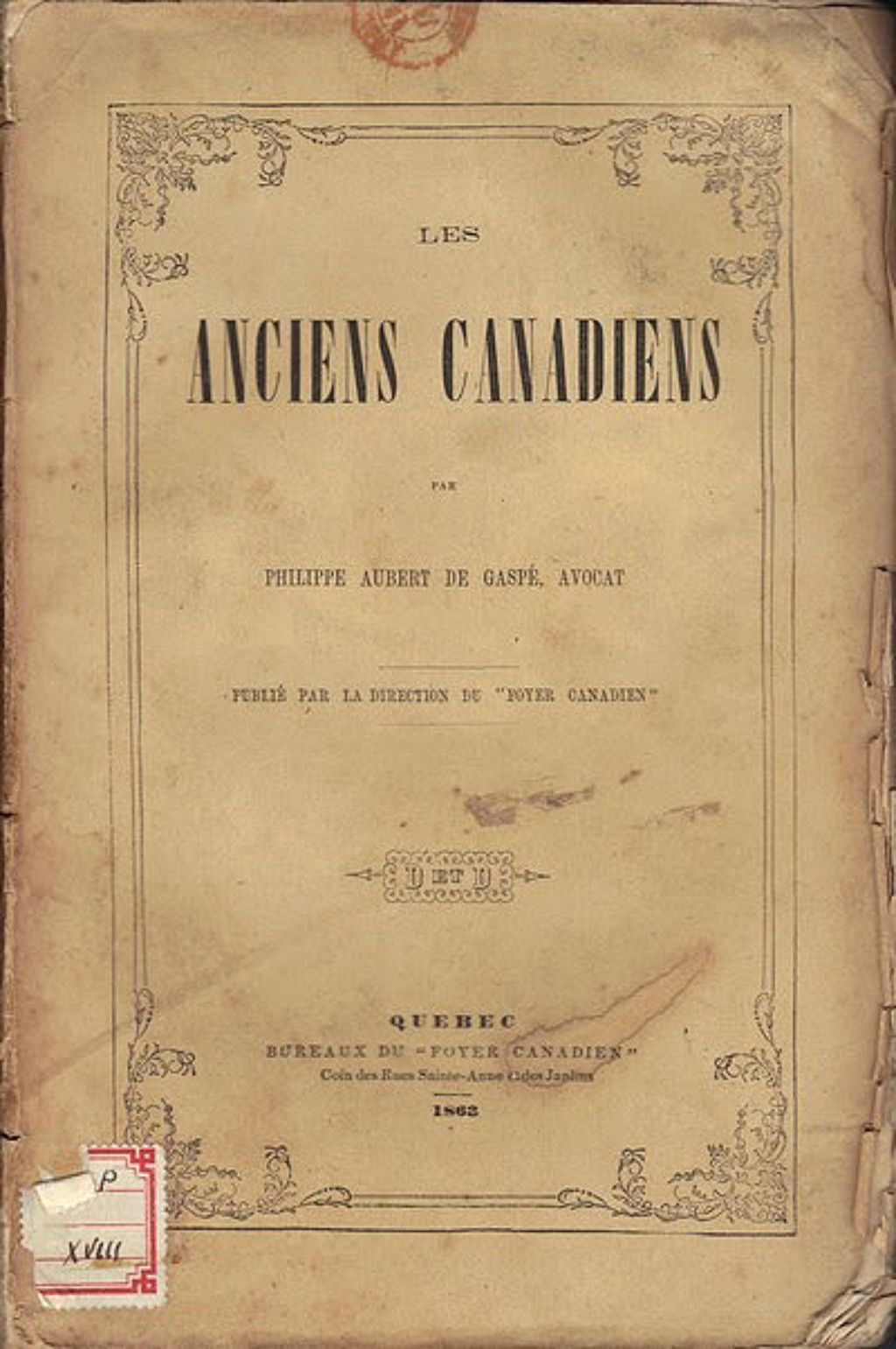
The Canadians of Old. Philippe Aubert de Gaspé, 1863.
“There was just a street between us. During long, sleepless nights, I saw the movements near their beds, the lights being turned on and off in one room and then another. I trembled each time I saw those signs of life disappear.”
Reinventing himself in old age
At 70 years old, he began writing The Canadians of Old, in which he described life in New France, the fratricidal divisions caused by the Conquest, and the colony’s traditions and legends, including that of an infamous woman named La Corriveau. He was 74 years old when his first novel came out. It was republished some 30 times.

Philippe Aubert de Gaspé. Author of The Canadians of Old. Wilson & cie, ca. 1882-1884.
Philippe Aubert de Gaspé threw himself into writing his memoirs, which offered several interpretive clues to his first novel.

Memoirs. Philippe Aubert de Gaspé, 1885.
On January 29, 1771, the father of Quebec’s novelists passed away. Admired by all as a witness to history, the last seigneur of Saint-Jean-Port-Joli reinvented himself in his later years, creating a literary tradition.
He proved Lord Durham wrong!

Philippe Aubert de Gaspé was a successful lawyer, businessman and sheriff who fell from grace. He was also passionate about literature. While serving time in prison from 1838 to 1841, he finally listened to his heart and found his true path: writing.
